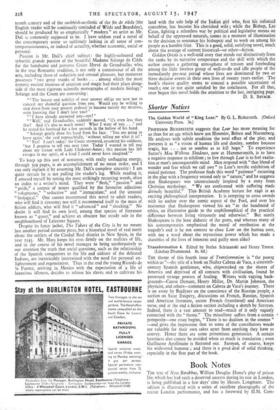Shorter Notices
PROFESSOR BICKERSTETH suggests that Lear has more meaning for us than for an age which knew not Himmler, Belsen and Nuremberg. He analyses with subtle erudition the total effect of the play, and presents it as " a vision of human life and destiny, sombre because tragic, but . . . not so sombre as to kill hope." To experience Sartre's Men Without Shadows, now at Hammersmith, is to have a negative response to nihilism ; to live through Lear is to feel exalta- tion at man's unconquerable mind. Men respond with " that blend of wonder and fear which we call awe " to Lear's terrific exhibition of stoical patience. The professor finds this word " patience " recurring in the play with a frequency second only to "nature," and he suggests that Shakespeare was unconsciously inspired by a story from Christian mythology. " We are confronted with suffering made divinely beautiful." This British Academy lecture for 1946 is an exciting philosophical interpretation. It is tempting to cross swords with its author over the comic aspect of the Fool, and over his insistence that Shakespeare viewed his art "as the handmaid of ethics, an illustrative guide to the unphilosophical of the practical difference between living virtuously and otherwise." But surely Shakespeare is the least didactic of the poets, and whereas many of his contemporaries emphasised the moral of retribution at the tragedy's end is he not content to close Lear on the human note, with not a word about the mysterious power which has made a shambles of the lives of innocent and guilty men alike?


































 Previous page
Previous page